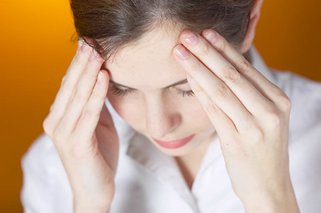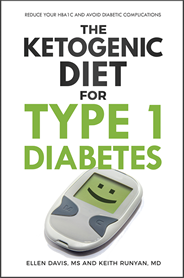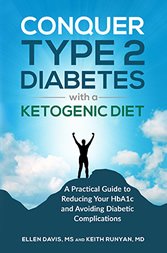Low Carb Diet Side Effects
Last edited May 16, 2022
Most low carb diet side effects are manageable if you understand why they happen and how to minimize them. Understanding your physical reactions will help you avoid the worst of the symptoms and keep you from quitting before you get out of the chute, so to speak. After several weeks, these side effects will subside as you become "keto-adapted" and able to burn fat instead of glucose for fuel. The list below includes the most common low carb diet side effects, and I've included tips on how to handle them.
The only caveat is that you have no contraindicated health conditions. I have detailed here who should NOT follow a ketogenic diet.
Frequent Urination
One of the low carb diet side effects that appears after about 24 hours on the diet is a loss of water. By day 2, you will notice that you are in the bathroom urinating more often. This happens because your body is burning through the extra glycogen (stored glucose) in your liver and muscles, and your blood insulin levels are dropping. Breaking down glycogen releases a lot of water. As your carb intake, insulin levels and glycogen stores drop, your kidneys will start dumping this excess water.
In addition, as your circulating insulin levels drop, your kidneys start excreting excess sodium, which will also cause more frequent urination. (see this reference).
Fatigue and Dizziness
As you start dumping water, you'll lose minerals such as salt, potassium and magnesium as well. Having lower levels of these minerals will make you very, very tired, lightheaded or dizzy, give you muscle cramps, and headaches. You may also experience skin itchiness.
Fatigue and dizziness are the most common of the low carb diet side effects, and they can be avoided for the most part by making sure you stay ahead of mineral loss. You can counteract mineral losses by eating more salt or sipping salty broth throughout the day, and eating potassium rich foods. (Dairy foods, green leafy vegetables and avocados are high in potassium).
As long as your carb intake is below 60 carbs a day, you will need to continue to eat a moderate amount of salt (5 gram/day which is about the same as the standard American diet provides). However, if you take medicine for high blood pressure, check with your doctor.
In addition, you may want to take 400 mg of magnesium citrate every night before bed. (Check with your doctor first if you have kidney or heart health issues).
It's also really important to eat at least 2 cups of raw green leafy vegetables every day. These vegetables provide potassium and vitamin K, and will also help with hunger.
Hypoglycemia (Low Blood Sugar)
If you've been eating a higher carb diet, your body is used to putting out a certain amount of insulin to take care of the sugar which gets created from all that carbohydrate intake. When you suddenly drop your carb intake on a ketogenic diet plan, you may have some transient low blood sugar episodes that will feel very scary. See my reactive hypoglycemia page for more information on the symptoms, and what to do.

Headaches
While your body is adapting to ketosis, headaches can manifest for various reasons. You may also feel a little lightheaded, and may experience some flu-like symptoms for a few days. In my experience, it's usually a mineral issue. To see if it's sodium loss, try putting a quarter teaspoon of salt in a glass of water and drink it. You should feel better in about 20 minutes.
Overall, it's important at the start of the diet to increase your salt and water intake. It will get better after 3-4 days. If it doesn't, add a little more carb to your daily total. This is one of those low carb diet side effects for which I don't have a solid explanation, and it seems to vary by person.
Constipation
This is another one of the most common low carb diet side effects, and is usually a function of dehydration, salt loss, eating too much dairy or too many nuts, or possibly magnesium imbalances. The magnesium mentioned under the fatigue entry above will help with this. If 400 mg of magnesium citrate isn't helping, you may want to cut back on your dairy product consumption to rebalance your calcium intake to your magnesium intake, drink lots more water or cut back on the amount of nuts you are eating.
If these tips don't help, Dr. Georgia Edes of Diagnosis Diet has a great post on this here with other suggestions.
Sugar Cravings
As your body goes through the process of retrofitting itself to burn fat instead of sugar, there's a two to 21 day transition period where carb cravings will be worse. Try some of the tips I recommend on how to stop sugar cravings. If you can wait it out, the cravings will subside and eventually disappear, as long as you don't cheat. Eating a large amount of carb will bring the cravings right back, and for some of us, eating sugar in any amount will start the slide down that slippery slope to carb overload.
Diarrhea
This low carb diet side effect is not unusual, and should resolve itself over a few days. It can happen just because of the change in diet, or if an unwise decision is made to also limit fat intake on a low carb diet, which results in eating too much protein. Eating a high protein, low carb AND low fat diet will cause the loose bowel symptoms of a condition called "rabbit starvation". (Arctic explorers described getting this when only lean rabbits were available to eat.)
Make sure you replace the carbs you are cutting with more fat, preferably saturated fat such as butter or coconut oil. Following a ketogenic diet menu means you can choose fattier cuts of meat, and use heavy cream in your coffee.
To treat, try a teaspoon dose of sugar-free Metamucil or plain psyllium husk powder right before you eat a meal. The fiber will absorb the excess water in the colon and should help resolve loose stools.
Shakiness or Weakness
This is a side effect of hypoglycemia or low blood sugar. It could also be a symptom of low mineral levels. Add some more protein to your daily diet to offset the drop in blood sugar levels, and eat more salt (put a 1/4 teaspoon of salt in a glass of water and drink it) and include more potassium containing foods. You could also take 1-3 potassium citrate supplements of 99 mg, but no more than that. It's better to get potassium from food. Taking too many potassium supplements can stop your heart, so choose food.
Muscle Cramps
This is another side effect of the loss of minerals, specifically magnesium. In their excellent book The Art and Science of Low Carbohydrate Living: An Expert Guide to Making the Life-Saving Benefits of Carbohydrate Restriction Sustainable and Enjoyable, Drs. Jeff Volek and Stephen Phinney recommend taking 3 slow release magnesium tablets such as Slow-Mag or Mag 64 for 20 days, then continuing to take 1 tablet a day afterwards.
NOTE: if you have kidney problems or kidney failure, don't take oral magnesium supplements without checking with your doctor.
Sleep Disturbances
Some people report that they can't stay asleep when on a ketogenic diet. This may be an indication that insulin and serotonin are low. Try this solution: eat a snack which contains both protein and some carbohydrate right before bed. The carbohydrate will increase insulin, which will allow more tryptophan from the protein to get into the brain.
Tryptoplan is the precursor for serotonin which has a calming effect on the brain. See this article and this paper. Greek yogurt with a 1/2 tablespoon of fruit spread or a little square of 70% chocolate is one possibility. This is another of those low carb diet side effects which seems to vary by person. I wish somebody would do a study on this.
In addition, there may be a histamine intolerance involved. Low carb diets are higher in histamine containing foods, and some people react to higher intake of these foods with anxiety and sleeplessness. See this post on histamine intolerance.
I have also discovered that taking my vitamin supplements before bed is not conducive to sleeping well.
Kidney Stones
People critical of the ketogenic diet will bring this side effect up to convince people that low carb diet side effects are dangerous. They base this on the reports of higher rates of calcium based kidney stones reported by physicians who administer ketogenic diets for children with epilepsy. But this is not an accurate comparison.
First, the diets that are fed to epileptic children are close to 90% fat, and second, processed powders like Ketocal for making shakes are used extensively in the diets of epileptic children, especially in the hospital. A real food ketogenic diet is very different, and includes more protein. However, at least in epileptic children, the latest research on stone formation on ketogenic diets suggests a citrate supplement can minimize this risk. See this paper.
In addition, there are independent variables that have to be kept in mind. A paper here discusses some of these issues. In particular, if you are taking lots of vitamin D without corresponding amounts of vitamin A or K2, and magnesium, you are increasing your risk for kidney stones in general. In addition, it is a fact that for the first 6-8 weeks of being on a ketogenic diet, uric acid levels in the body will increase, since ketones compete with uric acid for excretion via the kidneys.
Inadequate hydration is also a huge factor for kidney stone formation. Make sure you drink lots of water throughout the day.
Be sure you talk to your doctor before taking any potassium citrate or other citrate supplement, especially if you have kidney or blood pressure issues.

Lowered T3 Thyroid Hormone Levels
Although this side effect is usually presented as a negative, it is in reality just a natural consequence of being in ketosis and eating less food, which is what usually happens when you are keto-adapted and hunger is reduced. The same thing happens on calorie restricted high carb diets.
In addition, it's possible that the body becomes more sensitive to T3 when you are in ketosis, so it doesn't need as much T3 to get the same job done. Dr. Ron Rosedale discusses why lower thyroid "speed" is beneficial here, and there's a great post here. There's another nice post here on the Ketotic blog, and a more recent post by expert Dr. Steve Phinney here.
Heart Palpitations or a "Racing" Heart
Some people may experience heart palpitations or a racing heart when starting a ketogenic diet or after having been on it for few weeks or months. It’s been reported that this is more likely if the person normally has low blood pressure. There are several other factors which may be involved in this low carb diet side effect as well.
- Nutrient deficiencies may be involved. This is why a multivitamin containing the RDA for especially selenium and zinc, plus a magnesium supplement, broth or mineral water are strongly recommended.
- The person may be insulin resistant and lowering carbohydrate intake can result in transient hypoglycemia. Hypoglycemia can also result from not eating often enough or not eating enough protein and fat.
- There may be an electrolyte imbalance or you may be dehydrated. Getting enough salt, magnesium and potassium rich foods is your best defense. In addition, drink plenty of water.
- Some people may have “racing” heart reactions to excessive coconut oil or medium chain triglyceride (MCT) oil consumption. As you add these oils to your diet, start with small amounts and increase over time. Don’t rely on coconut or MCT oil for your only fat intake. Be sure to include other fats such as butter, ghee, olive oil, and animal fats as well.
- Although a ketogenic diet does allow for adequate protein, for some people, activity levels or other factors may necessitate a need for a higher protein intake. Heart palpitations may be an indication of this. In simpler terms, protein intake may be too low for daily needs. Try adding 5-10 grams of protein to each meal.
- May be a reaction to removal of oxalates from diet. See below for more information about oxalate dumping.
Rashes, Stomach Issues, and Joint Pain
These symptoms usually get better on a ketogenic diet, but if you are particularly sensitive to plant chemicals, you may be experiencing a little-discussed phenomenon called "oxalate dumping". Oxalates are defensive chemicals found in plant foods, in particular almonds, leafy greens like spinach and Swiss chard, and dark chocolate.
Since most of the foods mentioned above are allowed on a ketogenic diet, you don't hear much about oxalate issues in ketogenic diet circles. But as people move toward eating more meat and drop these foods, (toward adopting a carnivore or meat only diet) this oxalate dumping issue may surface. There's not a lot of research on it, but there is quite a bit of anecdotal evidence. Elliott Overton at Holistic Health talks about this on a podcast here.
Hair Loss
Some people report that they experience accelerated hair loss when on a low carb or ketogenic diet. This phenomena is not related strictly to a ketogenic diet, but is more likely associated with any major change in diet. It's a process called "telogen effluvium," medical lingo for hair loss due to a change in metabolism or hormone levels. Ketogenic diets lower insulin, one of the main human hormones, and hair loss may be one of the natural but temporary low carb diet side effects from normalized insulin levels.
Dr. Steve Phinney has mentioned in interviews that a zinc deficiency is another factor to check if hair loss occurs on a keto diet. He and Dr. Volek discuss this in Chapter 9 of The Art and Science of Low Carbohydrate Performance. Dr. Andreas Einfeldt writes about this here, and Dr. Mike Eades also discusses it here.
In addition, hair loss may be a function of not getting enough protein. As I say on my keto diet plan page, base your protein intake on your ideal body weight or lean body mass, not as a percentage of total macros. In other words, if your lean body mass (LBM) is 120 pounds (54 kg), you need to eat at least 1 -1.5 grams of protein per kg of LBM, which would be 54-108 grams of protein per day.
Low Carb Diet Side Effects Are Temporary
So, there you are. If you plan for them, these low carb diet side effects can be minor obstacles, and after you adjust to the diet, they should get better and finally subside. After that, you ought to be feeling pretty darned good! See my list of ketogenic diet benefits here for a preview.
Resources for More Information
All of my books are available in electronic PDF, and now in paperback on Amazon!
 |
 |
 |
|
Buy paperbook on Buy paperback on Amazon Buy the e-Book via Paypal |
Buy paperback on Buy paperback on Amazon Buy the e-Book via Paypal |
Buy paperback on Buy paperback on Amazon Buy the e-Book via PayPal |
Done with Low Carb Diet Side Effects, back to Ketogenic Diet Plan